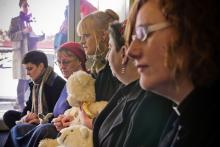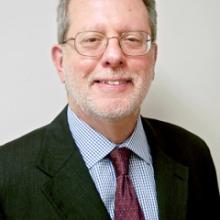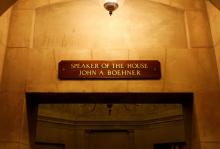Immigration

People know.
Not just Americans, but the entire globe.
People know that the founders didn't mean it then, nor does this nation mean it now. Sure, the words were written down, and our leaders frequently point to them as evidence that we are good. But no one really meant them. They were merely a means to an end.
Back in 1776, when representatives from a bunch of colonies wrote the words, "We hold these truths to be self-evident, that all men are created equal," they did not in fact mean all men.
But people know that.

The horrible events in Murrieta, California on Tuesday reminds of the most important immigration talk I’ve given this year—the one I gave to my son’s fifth grade class.




'The Stranger' offers just a few illustrations of the millions of lives that are negatively impacted by our immigration laws. The personal stories of immigrants who are facing the unintended consequences of our countries broken immigration policies are often left out of the national debate. The strength of the film lies in the fact that it puts a face to the issue of immigration and highlights the moral responsibility we have as people of faith to respond.

Many people like to point out that people should just do things the “right way.” While I agree with the premise of this statement, the likelihood of success for many people of color is slim to none. The reality is that people of African descent are not always given the same opportunities as those from other countries.

“We will not only win victory for ourselves; we will appeal to your heart and conscience that we will win you in the process and our victory will be a double victory.” – Martin Luther King, Jr.
Four years ago I was working a corporate job for a national AFL team. It was well paid. I had great opportunities. Life was good. If you had told me that I was going to become a Christian, I would have laughed in your face. If you had gone on to say I would leave my well-paid job to spend my days running a Welcome Centre for refugees while working side jobs to make ends meet, I would have questioned your mental health. If you had added that I would be arrested with church leaders and a rabbi while continuing Martin Luther King’s work, it would have certified to me that you were crazy.
On Monday I walked into Austrailian MP Jamie Briggs' office to be arrested with seven Christian leaders and a rabbi. It sounds like the start of a joke. (My life is teaching me God has a great sense of humor.)
Why were we arrested? There are 983 children and their families currently in Australia’s detention centers.
These children are kids just like our own, with their made-up games, whispered jokes, and giggles. Their families dream of a future of safety. Our incoming Governor of South Australia, Hieu Van Le, arrived by boat in Darwin seeking refuge 36 years ago, with “nothing but a suitcase filled with invisible dreams. A dream to live in a peaceful, safe and free country and to live a meaningful and fulfilling life.” In the past, Australia has been the kind of nation that grants dreams like this – why not for the 983 future Hieu Van Le’s and their families in detention?
A world away and so many years later, how is Martin Luther King’s freedom movement related to the current plight of asylum seekers in Australia? Well, the links are stronger than you think.

When I share the story of how brutal the path to citizenship is for us, people are often shocked. We are not what people have in mind when they think of ‘immigrants.’ We are white. We speak English. We have graduate level degrees. And yet even for us, as documented workers, it sometimes seems nearly impossible that we will be able to gain permanent residency. The path is so much narrower and steeper than people realize, so we speak up.
I speak up because I would love legal residency to be more easily within our reach. As a mom, it would give me so much peace of mind to know we could continue to build a life in the U.S. with our children. But mostly, I speak up because I can. As a legal immigrant, I have a first-hand perspective on just how harsh the current legislation can be, and I also have the freedom to speak about it without fear of being deported.
And so I speak and write in favor of equitable and reasonable immigration reform. I believe it is the right thing to do ethically, and it is the wise thing to do socially and economically. However, whenever I raise the issue I am met with this response: “We’re not objecting to you — because you got here legally and have obeyed all the laws. We are objecting to all the law-breakers who are here illegally: if they disrespected the law, they should not be rewarded for it!”

Right-wing politicians are fond of saying we need more Christian influence in American political life.
I don’t disagree with that. But I wonder if they have any idea what they are asking. For a nation guided by Christian principles would bear scant resemblance to their political agenda.
Take immigration, for example. Jesus practiced radical welcome, not the restrictive legalistic barriers envisioned by conservatives, and certainly not the denigration of dark-skinned immigrants and the unleashing of armed posses along the Rio Grande.
God’s people, after all, began as immigrants and refugees. God saw them as a “beacon” to all nations.

In 1910 my great-grandmother, Gelsamine Ferrigno, arrived at Ellis Island — a teen bride with her husband and two children desperate to make a better life. The story that has been passed down, confirmed by relatives both here and in Italy, is that the family decided that Gelsamine and Albert were the most likely to succeed so they pooled their resources, put them on a boat to America, said their goodbyes and told them to get work, make money, and send it back to their needy family in Solerno, Italy.
I often think about the elements of what I know of my story: immigrants from Italy, teenagers bearing a family burden, pressure to learn language and culture, permanent goodbyes to everything they ever knew, loneliness, fear.
There are two main reasons I often reminisce on this story in my family history. First, I am eagerly working to support reform to our immigration laws for the immigrants of today.
Our immigration laws are broken and are in dire need of some attention. Families are being separated, a permanent underclass is being kept in the shadows, and our country continues to thrive on the adage “we want your work, we just don’t want you.” It is not just. It is not biblical, and there is no reason for politicians to willfully put politics before the needs of vulnerable people in our communities.



With the growing crisis of undocumented minors coming to the United States without a parent or guardian, the National Latino Evangelical Coalition (NaLEC) urged the government to allow them to provide compassionate care to these at-risk youth.
NaLEC president Rev. Gabriel Salguero is confident that the church will play a crucial role in solving this humanitarian crisis, just like it supports people through so many crises.
“It is incomprehensible to us that faith leaders and relief agencies who are at the forefront of responding to natural disasters, foster-care, and even ministry to detainees across the nation and world, are being kept from doing what we do best, compassionate service. The U.S. should create policies that facilitate this partnership,” Rev. Salguero said in a news release.
The influx of unaccompanied minors into the United States is primarily caused by drug-related violence in Central America, which leaves children looking for a safe haven. Hispanic evangelical churches are already working with partners in Central America to fight against this violence.
“We are working with our faith partners in Honduras, El Salvador, and Guatemala to respond to some of the core causes like increased gang-violence and issues of deprivation. Any exclusion of communities who are ready to help is creating an unnecessary obstacle with a great track record of humanitarian responses,” Rev. Salugero added in the release.

Yesterday was one of the craziest days in recent American political history. House Majority leader Eric Cantor fell to Tea Party economics professor David Brat in a primary upset no pundit saw coming.
While the early analysis suggested that support for immigration reform may have been what brought Cantor down, exit polling suggests his lack of attention to the concerns of his constituents and his inability to deliver on his promises were a greater factor than the immigration issue. Cantor never brought a vote on immigration to the floor and was never a strong ally on immigration.
Earlier on Tuesday, the Public Religion Research Institute (PRRI) released an immigration poll at the Brookings Institute. Nearly 80 percent of all Americans and nearly two-thirds of white evangelical Protestants remain in support of immigration reform that includes a path towards citizenship or legal status.

The stunning primary defeat of Eric Cantor could be a blessing for passing immigration reform. Cantor, as Majority Leader in the House and the number two Republican, was no ally of immigration reform and was likely an obstacle to crucial bi-partisan action. Always lurking in the shadows and clearly hoping to be the next Speaker of the House, Cantor was a threat to John Boehner. Apparently, continually working the inside game to become the Speaker, instead of being a member of Congress who represented his district was one of the biggest reasons Cantor lost his election.


